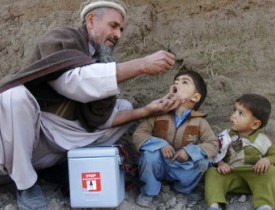AVA- The Italian government today contributed 4.3 million euros to eradicate polio in Afghanistan and improve the nutritional status of children under the age of five.
Of this amount, 2.5 million euros will go to UNICEF and the World Health Organization (WHO), which are both working in the framework of the National Emergency Action Plan for Polio (NEAP) aimed at interrupting the disease transmission in Afghanistan.
The remaining 1.8 million euro have been granted to UNICEF to improve the coverage and quality of nutrition services for children under five, adolescent girls and mothers in the most deprived provinces.
Underlining Italy’s commitment to improve the health of Afghan children, the Italian Ambassador to Afghanistan, Roberto Cantone, said that this contribution is offering them the opportunity to be healthy and develop and progress in life for the benefit of the whole country.
The Italian funding addresses two of the country’s main health priorities: polio and nutrition. Polio is a highly infectious but entirely preventable disease which remains endemic in only three countries in the world – Afghanistan, Pakistan and Nigeria. There has been immense progress in eradicating polio in Afghanistan and the country is closer to stopping transmission than ever before.
“Afghanistan has come a very long way in working towards being a polio free country,” said Dr. Rik Peeperkorn WHO Representative in Afghanistan. “This generous financial support will play a critical role in taking another step forward in eradicating polio from the country.”
Around 10 million children under five receive vaccinations multiple times every year, in all areas of the country. The Italian funding covers training and supporting vaccinators and social mobilizers, who are instrumental in generating demand for vaccination, and in the delivery of vaccines. The funding will also be used for monitoring the coverage and the quality of vaccination activities.
In Afghanistan 41 per cent of children are stunted and a further 1.2 million malnourished. Stunting and malnutrition have immediate and long-term impact on a child’s physical and mental wellbeing. If the brain is underdeveloped by the age of two, it is irreversible and cannot be repaired. Malnourished children are also much more susceptible to diseases, such as polio and other infectious sickness.
“Improving the nutritional status of children in Afghanistan is a priority,” said Adele Khodr, UNICEF Representative in Afghanistan. “When children don’t get the nutrients they need at a young age they are not able to reach their full potential and Afghanistan misses out on one of its most valuable resources - its children.”
The new funding will play a critical role in preventing further cases of malnutrition and actively identifying cases for treatment. This includes strengthening community-based nutrition programming, with a focus on maternal nutrition, and infant and young child feeding practices, as part of an integrated management of acute malnutrition.







